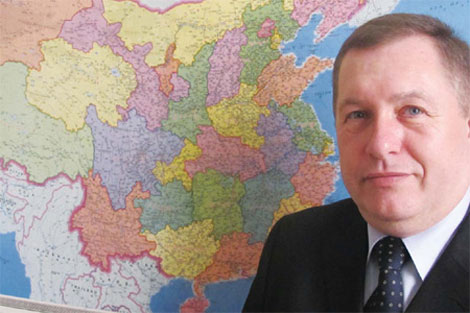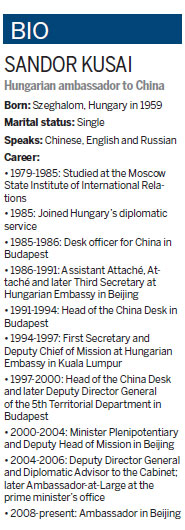Hungary's china hand
Updated: 2011-04-15 11:24
By Mike Peters (China Daily European Weekly)
 |
|
Sandor Kusai has been a diplomat for 14 years and 80 percent of that time has been spent in China. Mike Peters / China Daily |
Rise of china is an inevitable historical process, says ambassador
Editor's note: This is the first of a monthly series on European ambassadors.
Sandor Kusai isn't merely fascinated by China's opening up three decades ago. He's begun to feel part of it.
"I have been Hungary's ambassador to China since 2008," he says at his office in Beijing, "but I first began studying about China at university in 1979, which coincided with the beginning of the (Deng Xiaoping's) opening up and reform program."
The whole world seemed to be watching the long-closed China by then. Ping-pong players, Henry Kissinger and Richard Nixon had come and gone. Pandas had become the Middle Kingdom's first modern diplomats.
Western European members of NATO, anticipating a thaw, began to reach out to China.
For Kusai, it was the beginning of a personal relationship. "This is my third posting in China."
Kusai has been a diplomat for 14 years, and 80 percent of that time has been spent in China.
Ambassadorial postings are typically four years, and Kusai is in his third year in Beijing.
If he has a regret, he says, it's that he hasn't gotten to travel around China enough in his current appointment.
 |
"I get to the major cities," he says, "but some places I haven't been back to in 15 years."
His nation currently holds the rotating presidency in the European Union. Kusai appreciates the higher profile that provides, and the embassy and the EU delegation have teamed up for a number of joint projects, including an art competition for Chinese children.
The EU presidency brings little added burden to his country's diplomats since the Lisbon Treaty recently established the European Commission's foreign policy apparatus, currently directed by Catherine Ashton.
But Hungary's ambassador to China is busy enough, hosting 110 delegations last year - about three a week during non-holiday periods.
Back in 1980, foreigners in China had much more leisure, but China "has become so important politically and culturally", free time is harder to come by.
He savors a favorite escape right at the embassy: Ping-pong.
"I love it," he exclaims. "I'm not very good, but at least I try."
Is it politically correct for your Chinese staff to thrash the ambassador at the ping-pong table?
"They don't care," he says, roaring with laughter. "It's so exciting - the competitive fever is like being at a soccer match in Europe. Ambassador, driver, it's all the same."
Such people-to-people relationships are exactly why he loves travel - and sees rising tourism on both sides of the China-Europe relationship as one key to the future.
"All issues rely on the human factor," he says, "and we just don't know enough about each other."
Chinese visitors are fascinated by a Hungarian culture with roots in the Roman Empire, he says, while students in his country have embraced traditional Chinese medicine practitioners, which they have brought back to hot springs and spas at home.
Trade, of course, is another, and promoting business on both sides is at the top of any ambassador's to-do list.
"At home, Hungary is a mid-sized European country," he says. "From the Chinese view, Hungary is a small country with a population smaller than Beijing's. So the raw capacities are not comparable."
But Hungary has ways to stand out among European competitors.
"We were one of the first countries to recognize the People's Republic of China - in the latter months of 1949 - so we have always had good political dialogue at top levels."
Kusai notes that Hungarian Prime Minister Viktor Orban was in China last fall for the summit forum and closing ceremony of the Shanghai Expo. His country's last three premiers visited China five times over the past seven years, and Chinese leaders have visited Budapest as well.
Other advantages: "We are the geographical center of Europe," he says. "We are very close to Vienna, Brussels, anywhere else you want to go. Obviously, we are part of the EU, but we are also part of a very rich cultural area."
Hungarians are also so used to language barriers that they hardly see them. "Our language makes us very isolated in Europe," he says. Hungarian is a Uralic language that's not related to the Indo-European tongues that dominate in neighboring countries. "It's more like what they speak in Finland, Estonia - but really we don't understand them either," he says, so living and working with people who speak radically different languages is part of the national psyche.
Last year, bilateral trade was in the range of $8 billion (5.55 billion euros): $2.2 billion in Hungarian exports to China and $5.8 billion in Chinese goods going the other way.
While the balance of trade is leveling - 1:2.6 last year compared to 1:5 in 2009 - Kusai says you can't simply compare the import-export numbers.
"It's more complicated, more interwoven than that. Like other EU countries, we import a lot of semi-finished goods for the final production work in Hungary, and then those products become part of Hungarian exports.
"Machine tools, electronics, telecommunications - these things are going both ways, so the industries on both sides are tied to each other."
Overall, he says, Hungary has a general surplus despite the trade deficit with China, so the big picture is not a problem.
Kusai knows that China's rise worries some in the West, but the notion of a "China threat" makes him shake his head in frustration.
"I don't think that's clever - I don't like self-fulfilling prophecies," he says. "The rise of China is an inevitable historical process.
"For the rest of the world, the issue is not can it be prevented or how to prevent it, but how to use the process for our own good and for the good of humankind.
"There will be a difference in values for the foreseeable future," he says. "Meanwhile, China as a power has its own interests, and the rest of the world has its own interests. That is natural."
Maintaining the exchange of views, he says, and seeing China's rise in a positive way offers a path to smooth cooperation.
It's a path Hungary is ready to walk.
"There is a reason that Hungary has more Nobel Prize winners per capita - 14 from a population of 10 million - than any other country," he says proudly.
"We are innovative, forward-looking people, but we have both feet in our traditions."
E-paper

Pearl paradise
Dreams of a 'crazy' man turned out to be a real pearler for city
Literary beacon
Venice of china
Up to the mark
Specials

Power of profit
Western companies can learn from management practices of firms in emerging economies

Foreign-friendly skies
About a year ago, 48-year-old Roy Weinberg gave up his job with US Airways, moved to Shanghai and became a captain for China's Spring Airlines.

Plows, tough guys and real men
在这个时代,怎样才"够男人"? On the character "Man"
